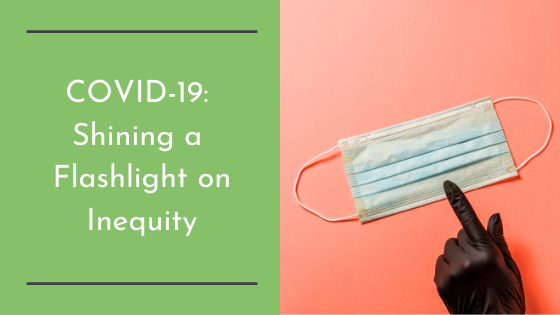Today’s blog is written by Molly Talbot-Metz, President & CEO, Mary Black Foundation
COVID-19: Shining a Flashlight on Inequity
In February, the Foundation’s Board of Trustees adopted a Health Equity Framework that we are using to guide our work. The Framework was developed after months of research into the social determinants of health. The World Health Organization states that many factors combine to affect the health of individuals and communities. Whether people are healthy or not, is determined by their circumstances and environment. In fact, the Robert Wood Johnson Foundation states that only 30% of a person’s health is impacted by their personal behavior. The remaining 70% stems from social and economic factors, physical environment, and clinical care. And, we know that inequities in these social determinants of health are often the result of centuries of unjust policies and structural discrimination that disproportionately affect people of color and low-income communities.
Looking at the Health Inequities
Our work to examine health inequities began long before COVID-19 penetrated our community, but the virus has clearly exposed the racial, ethnic, and socioeconomic inequities that have long impacted our community. It has been reported in a variety of news outlets that African Americans have been the hardest hit by this pandemic. South Carolina is no different. According to SC DHEC, on May 12th, there were over 7,600 COVID-19 cases and 320 deaths. 45% of the reported cases and 53% of the deaths were among African Americans, yet the African American population makes up only 27% of our state (U.S. Census).
This data is a stark reminder of the health inequities that the Foundation is working to change, but unfortunately, it is only one example. The inequities that are so obvious due to the COVID-19 data are the same inequities that we see across other health, education, economic, and social outcomes, as reported in the Spartanburg Racial Equity Index. Long before COVID-19, our community was unhealthy. The pandemic presents a moment in time when we can choose to make systemic changes that, moving forward, will give all people access to opportunities to thrive, both physically and mentally. Spartanburg has the ability to lead and be a model for other communities. As we look to emerge from this pandemic, we must ask ourselves what led to the inequities in the percentage of cases and deaths among African Americans and we must resolve to change the social and economic factors that continue to result in health inequities.
Looking Ahead
This pandemic has deepened the Mary Black Foundation’s commitment to the Health Equity Framework that was adopted earlier this year and it should serve as a catalyst for others to join us in the effort. I am hopeful that we can work together to create a healthier, more equitable future for all of our residents.

